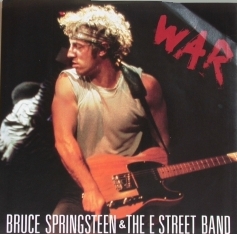 | WarEdwin Starr |
Writer(s): Norman Whitfield, Barrett Strong (see lyrics here) Released: June 10, 1970 First Charted: July 11, 1970 Peak: 13 US, 12 CB, 11 HR, 3 RB, 3 UK, 1 CN, 37 AU, 5 DF (Click for codes to singles charts.) Sales (in millions): 3.0 US, 0.2 UK Airplay/Streaming (in millions): -- radio, 25.4 video, 85.89 streaming |
 | WarBruce Springsteen |
Recorded: September 30, 1985 (live) Released: November 10, 1986 First Charted: November 21, 1986 Peak: 8 US, 9 CB, 12 RR, 4 AR, 18 UK, 11 CN, 38 AU, 1 DF (Click for codes to singles charts.) Sales (in millions): -- US, -- UK, -- world (includes US + UK) Airplay/Streaming (in millions): -- radio, 2.5 video, -- streaming |
Awards (Edwin Starr):Click on award for more details. Awards (Springsteen): |
About the Song:Motown liked to recycle songs amongst their roster of artists. In 1967, Gladys Knight & the Pips hit #2 with “I Heard It Through the Grapevine.” The next year, Marvin Gaye took it to #1. 1967 also saw Gaye paired with Tammi Terrell for the top-20 hit “Ain’t No Mountain High Enough,” a song which would top the charts in 1970 – in fact, it knocked Edwin Starr’s “War” from the perch. “War” was another of those recycled songs. The song was written by Norman Whitfield and Barrett Strong, who also penned “Grapevine.” They also wrote several top-10 hits for the Temptations, including the #1 “I Can’t Get Next to You.” The pair wrote everything for the Temptations’ 1970 album Psychedelic Shack, which included the non-single “War.” The song was “a hard, intense stomp-chant, as visceral as what the moment demanded.” SG Motown received hundreds of letters pleading for them to release it as a single FB but head honcho Berry Gordy was leary to unleash an anti-war song SG on the group’s “large and surprisinginly conservative Black middle-class audience.” BD Whitfield asked Edwin Starr if he’d like to record it. FB He was “a journeyman soul belter who was low on the Motown totem pole.” SG Essentially he had “no fan fase to alienate.” BD He’d been signed to the label in 1966, but didn’t record anything for two-and-a-half years while contract negotiations stalled. FB Finally, in 1969 he found success with the top-10 hit “Twenty-Five Miles,” but it was followed by several failed singles. The Temptations’ version of “War” “is nasty and funky, but it’s not the vein-throbbing wail that it would eventually become.” SG Starr’s version “was harder and choppier, all its power coming from that merciless rhythmic march…The groove is huge and all-consuming…There’s fuzz all over the guitars, and a nervous tambourine tingles all through it. This is weaponized music, music that’s impossible to ignore.” SG Vocally, Starr “swipe[s] all of [James] Brown’s affectations, right down to that perfectly placed ‘good God, y’all’ on the chorus.” SG Bob Dylan says, “One can’t help but wonder whether or not the peacenik sentiment behind the song was sincere or merely the next relevant subject to be mined in the attempt to reach Young America’s wallets…Even if it was a blatant exploitation of the peace movement, it’s still a stronger song than ‘Eve of Destruction.’” BD It is ironic that the song asking, “war, what is it good for?” is co-written by Barrett Strong who gave Motown “its first hit, that oft-covered anthem of avarice – ‘Money.’” BD In 1985, Bruce Springsteen performed “War” while touring in support of his monstrously successful Born in the U.S.A. album. The song was featured on the monstrously successful live box set in 1986 and was released as a single. Before singing, Springsteen offers his own perspective on the Vietnam War, for which he received a draft notice but then failed his physical. He warns the young members of the audience that the next time the country may come looking to them and that “blind faith in your leaders, or anything, will get you killed.” Resources:
Related Links:First posted 11/5/2022. |








No comments:
Post a Comment